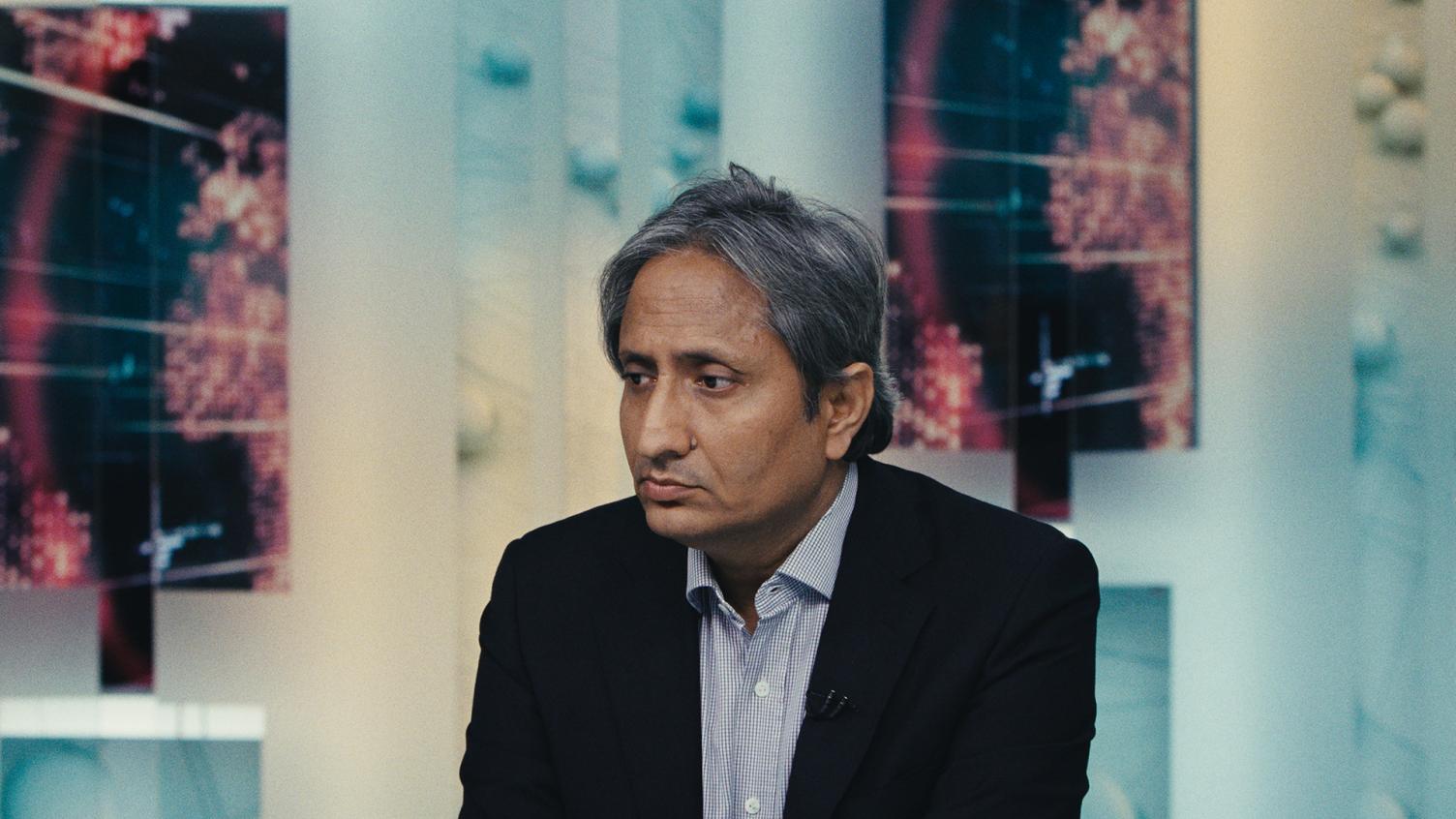Early in While We Watched, Vinay Shukla’s intimate documentary on the life and work of the acclaimed Indian journalist Ravish Kumar, we see the newsman receiving compliments from a fan at a petrol station. As Ravish takes leave of his discontent admirer, a faint smile crosses his face, only to dissolve into his trademark frown when his car leaves the station. The smiles will be fleeting all through Shukla’s film, much like the short-lived victories and brief moments of joy that the journalist experiences at home and his newsroom. For the most part, we witness Ravish drained, slouched in a chair, his hair dishevelled, his face buried in his palms or the crook of his elbow.
Long affiliated with the New Delhi Television (NDTV) before its hostile takeover by billionaire Gautam Adani in December 2022, Ravish Kumar came to be perceived as one of the last bastions of independent journalism in a media climate increasingly in thrall to the Narendra Modi-led Indian government. Structured around half-a-dozen key events from 2018-19 — including the attempted murder of student activist Umar Khalid, the attack on security personnel in Pulwama, Kashmir, and the General Election 2019 — While We Watched weaves a robust cause-and-effect narrative that offers a study in contrasts: we witness how Ravish’s sardonic, reasoned language in discussing these hot-button issues stands out against the strident demagoguery of his counterparts on other TV channels.
It isn’t a battle of equals by any means. Stacked against Ravish are not just vicious troll armies and powerful media houses attacking him covertly or otherwise, but also a malevolent state that grinds down dissident organizations by means of defamation lawsuits and income-tax raids. At one point in the film, a major scoop about an instance of cow vigilantism is thwarted by selective disruptions of the broadcast. Ravish’s phone buzzes with calls from bullies with the choicest invective and his physical safety is threatened, resulting in a police officer being assigned to escort him.
Ravish responds to such orchestrated harassment with a resigned smile, and notwithstanding his ordeal, he remains very much accessible to those reaching out to him. While We Watched is certainly a tribute to the journalist’s conviction and persistence, but Shukla isn’t interested in telling a triumphalist tale. The film is shot through with a melancholy reflective of Ravish himself, who registers less as an unflappable crusader demolishing ill-informed opponents (though he does get a moment or two of that) than a solitary romantic whose heart beats for a lost cause.
While We Watched places significant emphasis on Ravish’s perennial loneliness. The hawk-nosed journalist is largely seen in profile in tight closeups, severed, as it were, from the world around him. He is withdrawn into himself, even when he is at gatherings and parties, his face and body never ceasing to relay his disappointment and world-weariness. As other television channels grow in popularity and revenue, resignations and farewell parties multiply at Ravish’s office, his trusted colleagues moving on to greener pastures.
This solitude is redoubled by the format of Ravish’s prime-time show on NDTV which, as the fan at the petrol station points out, relies on the star-anchor’s persuasive monologues rather than the sensational panel discussions seen on other news channels. Is Ravish simply jaded and too much in love with his own voice to have invitees on his show? Or is it that he resists the faux-neutrality of such pseudo-debates that turn every story into an occasion for communal polarization? The film doesn’t tell us. But what is sure is that Ravish finds himself increasingly isolated from his peer group, with sporadic gestures of solidarity coming from fledgling journalists and college students. At regular intervals, we see him read his own words off a teleprompter, as though he is walled in by them, with no other voice coming in support.
In its unwavering focus on Ravish to the exclusion of other anchors working alongside him, While We Watched risks overstating his predicament and minimizing the role of NDTV as an institution with its own policies and imperatives. Even so, the film succeeds in giving a sense of what it takes to be a national journalist in India today, of the price to be paid in remaining upright in a world all too willing to bend down. Watching Ravish soldier on despite workplace attrition and dwindling spectatorship, continuing to gather information from conscientious reporters and disgruntled youth, we come to recognize the value of speaking truth as a worthy goal in itself, beyond its mediatic reach and capacity for influence. As Ravish put it in his now-famous speech at the Magsaysay award ceremony that bookends the film: “Not all battles are fought for victory. Some are fought simply to tell the world that someone was there on the battlefield.”
[First published in Sight and Sound]
